Economics Assignment: GDP, Inflation, Trade Agreements Analysis
VerifiedAdded on 2020/05/16
|7
|1494
|144
Homework Assignment
AI Summary
This economics assignment examines several key concepts. It begins by defining Gross Domestic Product (GDP) and its components, emphasizing its role as an indicator of economic growth and standard of living, while also acknowledging its limitations in fully capturing overall quality of life by not accounting for factors like income inequality, leisure, inflation, environmental conditions, and political dynamics. The assignment then delves into business cycles, discussing the problems of inflation and unemployment, and argues that unemployment is often a greater concern due to its more significant impact on individual welfare. Finally, it analyzes trade agreements, exploring their potential benefits, such as facilitating economic growth in developing countries through investment and technology transfer, while also highlighting potential drawbacks including brain drain, threats to domestic industries, and environmental concerns. The assignment concludes that trade agreements don't always reduce poverty and inequalities.
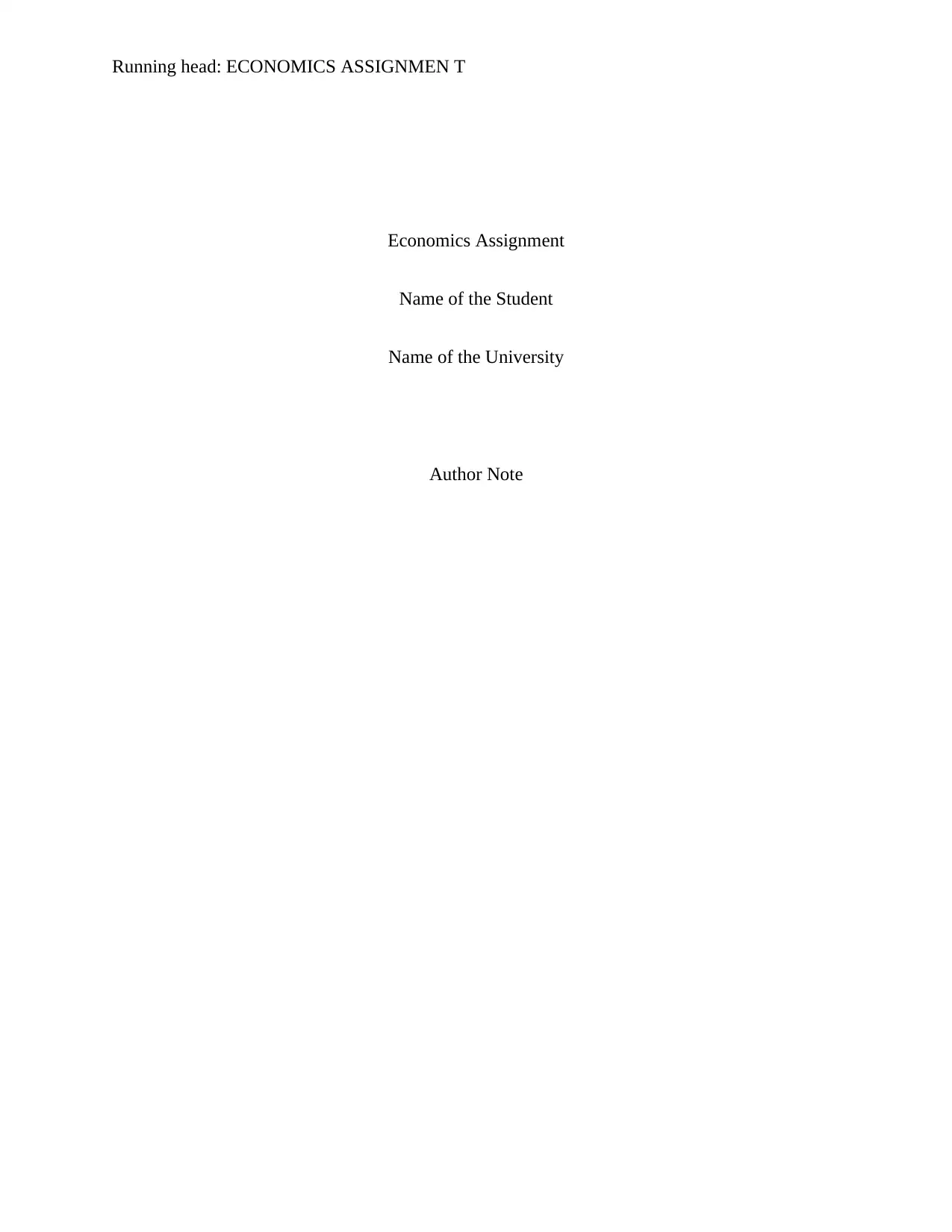
Running head: ECONOMICS ASSIGNMEN T
Economics Assignment
Name of the Student
Name of the University
Author Note
Economics Assignment
Name of the Student
Name of the University
Author Note
Paraphrase This Document
Need a fresh take? Get an instant paraphrase of this document with our AI Paraphraser

1ECONOMICS ASSIGNMENT
Table of Contents
Answer 1..........................................................................................................................................2
Answer 2..........................................................................................................................................4
Answer 3..........................................................................................................................................4
References........................................................................................................................................6
Table of Contents
Answer 1..........................................................................................................................................2
Answer 2..........................................................................................................................................4
Answer 3..........................................................................................................................................4
References........................................................................................................................................6
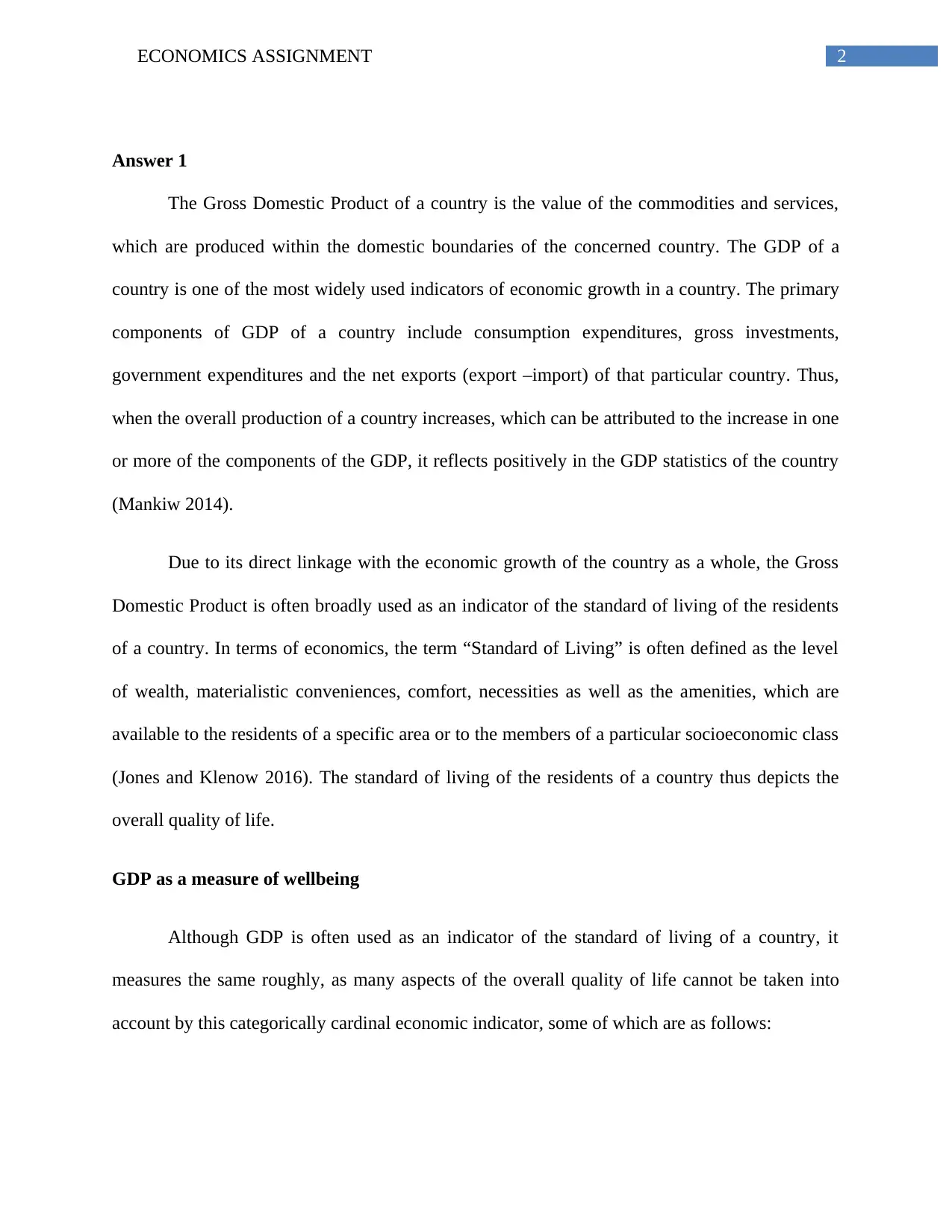
2ECONOMICS ASSIGNMENT
Answer 1
The Gross Domestic Product of a country is the value of the commodities and services,
which are produced within the domestic boundaries of the concerned country. The GDP of a
country is one of the most widely used indicators of economic growth in a country. The primary
components of GDP of a country include consumption expenditures, gross investments,
government expenditures and the net exports (export –import) of that particular country. Thus,
when the overall production of a country increases, which can be attributed to the increase in one
or more of the components of the GDP, it reflects positively in the GDP statistics of the country
(Mankiw 2014).
Due to its direct linkage with the economic growth of the country as a whole, the Gross
Domestic Product is often broadly used as an indicator of the standard of living of the residents
of a country. In terms of economics, the term “Standard of Living” is often defined as the level
of wealth, materialistic conveniences, comfort, necessities as well as the amenities, which are
available to the residents of a specific area or to the members of a particular socioeconomic class
(Jones and Klenow 2016). The standard of living of the residents of a country thus depicts the
overall quality of life.
GDP as a measure of wellbeing
Although GDP is often used as an indicator of the standard of living of a country, it
measures the same roughly, as many aspects of the overall quality of life cannot be taken into
account by this categorically cardinal economic indicator, some of which are as follows:
Answer 1
The Gross Domestic Product of a country is the value of the commodities and services,
which are produced within the domestic boundaries of the concerned country. The GDP of a
country is one of the most widely used indicators of economic growth in a country. The primary
components of GDP of a country include consumption expenditures, gross investments,
government expenditures and the net exports (export –import) of that particular country. Thus,
when the overall production of a country increases, which can be attributed to the increase in one
or more of the components of the GDP, it reflects positively in the GDP statistics of the country
(Mankiw 2014).
Due to its direct linkage with the economic growth of the country as a whole, the Gross
Domestic Product is often broadly used as an indicator of the standard of living of the residents
of a country. In terms of economics, the term “Standard of Living” is often defined as the level
of wealth, materialistic conveniences, comfort, necessities as well as the amenities, which are
available to the residents of a specific area or to the members of a particular socioeconomic class
(Jones and Klenow 2016). The standard of living of the residents of a country thus depicts the
overall quality of life.
GDP as a measure of wellbeing
Although GDP is often used as an indicator of the standard of living of a country, it
measures the same roughly, as many aspects of the overall quality of life cannot be taken into
account by this categorically cardinal economic indicator, some of which are as follows:
⊘ This is a preview!⊘
Do you want full access?
Subscribe today to unlock all pages.

Trusted by 1+ million students worldwide
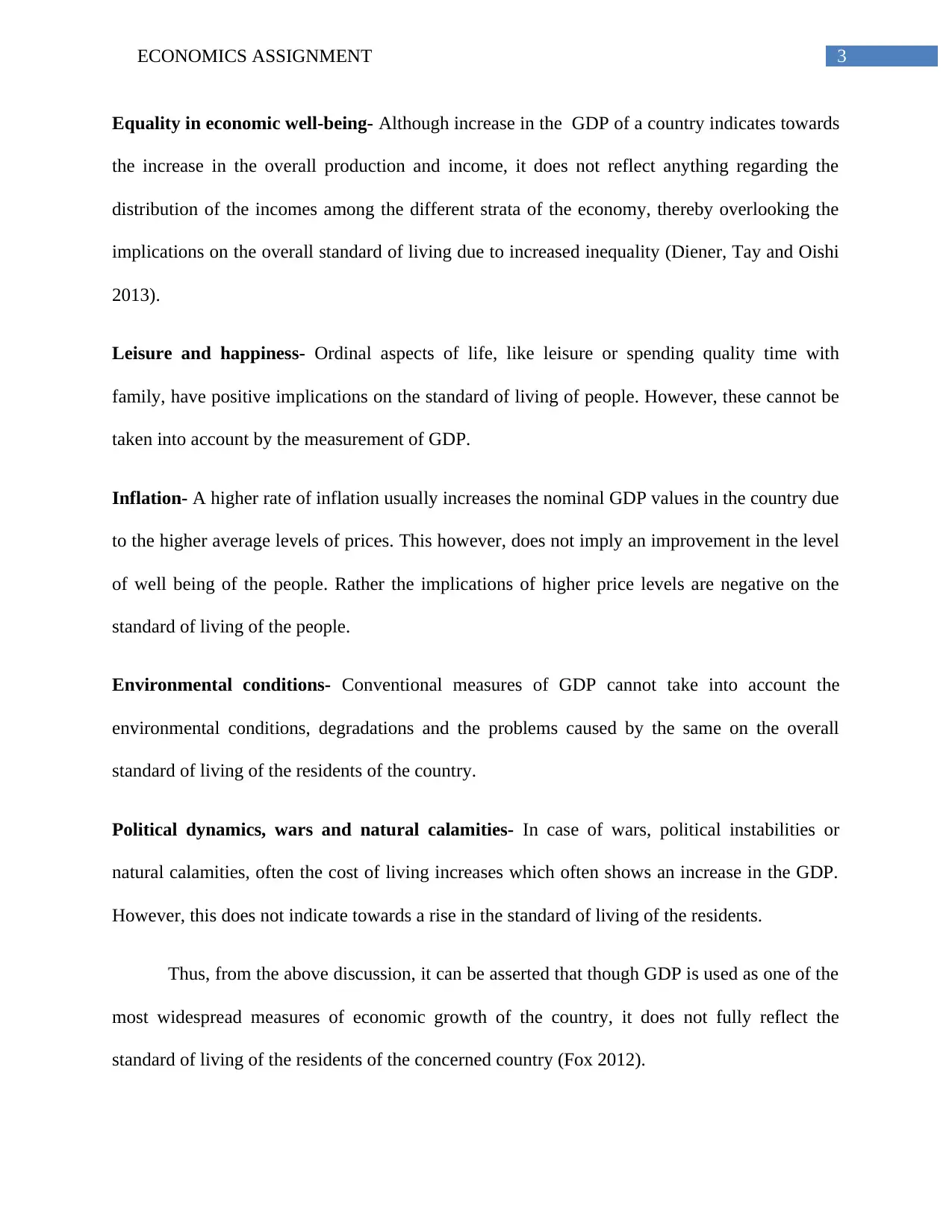
3ECONOMICS ASSIGNMENT
Equality in economic well-being- Although increase in the GDP of a country indicates towards
the increase in the overall production and income, it does not reflect anything regarding the
distribution of the incomes among the different strata of the economy, thereby overlooking the
implications on the overall standard of living due to increased inequality (Diener, Tay and Oishi
2013).
Leisure and happiness- Ordinal aspects of life, like leisure or spending quality time with
family, have positive implications on the standard of living of people. However, these cannot be
taken into account by the measurement of GDP.
Inflation- A higher rate of inflation usually increases the nominal GDP values in the country due
to the higher average levels of prices. This however, does not imply an improvement in the level
of well being of the people. Rather the implications of higher price levels are negative on the
standard of living of the people.
Environmental conditions- Conventional measures of GDP cannot take into account the
environmental conditions, degradations and the problems caused by the same on the overall
standard of living of the residents of the country.
Political dynamics, wars and natural calamities- In case of wars, political instabilities or
natural calamities, often the cost of living increases which often shows an increase in the GDP.
However, this does not indicate towards a rise in the standard of living of the residents.
Thus, from the above discussion, it can be asserted that though GDP is used as one of the
most widespread measures of economic growth of the country, it does not fully reflect the
standard of living of the residents of the concerned country (Fox 2012).
Equality in economic well-being- Although increase in the GDP of a country indicates towards
the increase in the overall production and income, it does not reflect anything regarding the
distribution of the incomes among the different strata of the economy, thereby overlooking the
implications on the overall standard of living due to increased inequality (Diener, Tay and Oishi
2013).
Leisure and happiness- Ordinal aspects of life, like leisure or spending quality time with
family, have positive implications on the standard of living of people. However, these cannot be
taken into account by the measurement of GDP.
Inflation- A higher rate of inflation usually increases the nominal GDP values in the country due
to the higher average levels of prices. This however, does not imply an improvement in the level
of well being of the people. Rather the implications of higher price levels are negative on the
standard of living of the people.
Environmental conditions- Conventional measures of GDP cannot take into account the
environmental conditions, degradations and the problems caused by the same on the overall
standard of living of the residents of the country.
Political dynamics, wars and natural calamities- In case of wars, political instabilities or
natural calamities, often the cost of living increases which often shows an increase in the GDP.
However, this does not indicate towards a rise in the standard of living of the residents.
Thus, from the above discussion, it can be asserted that though GDP is used as one of the
most widespread measures of economic growth of the country, it does not fully reflect the
standard of living of the residents of the concerned country (Fox 2012).
Paraphrase This Document
Need a fresh take? Get an instant paraphrase of this document with our AI Paraphraser
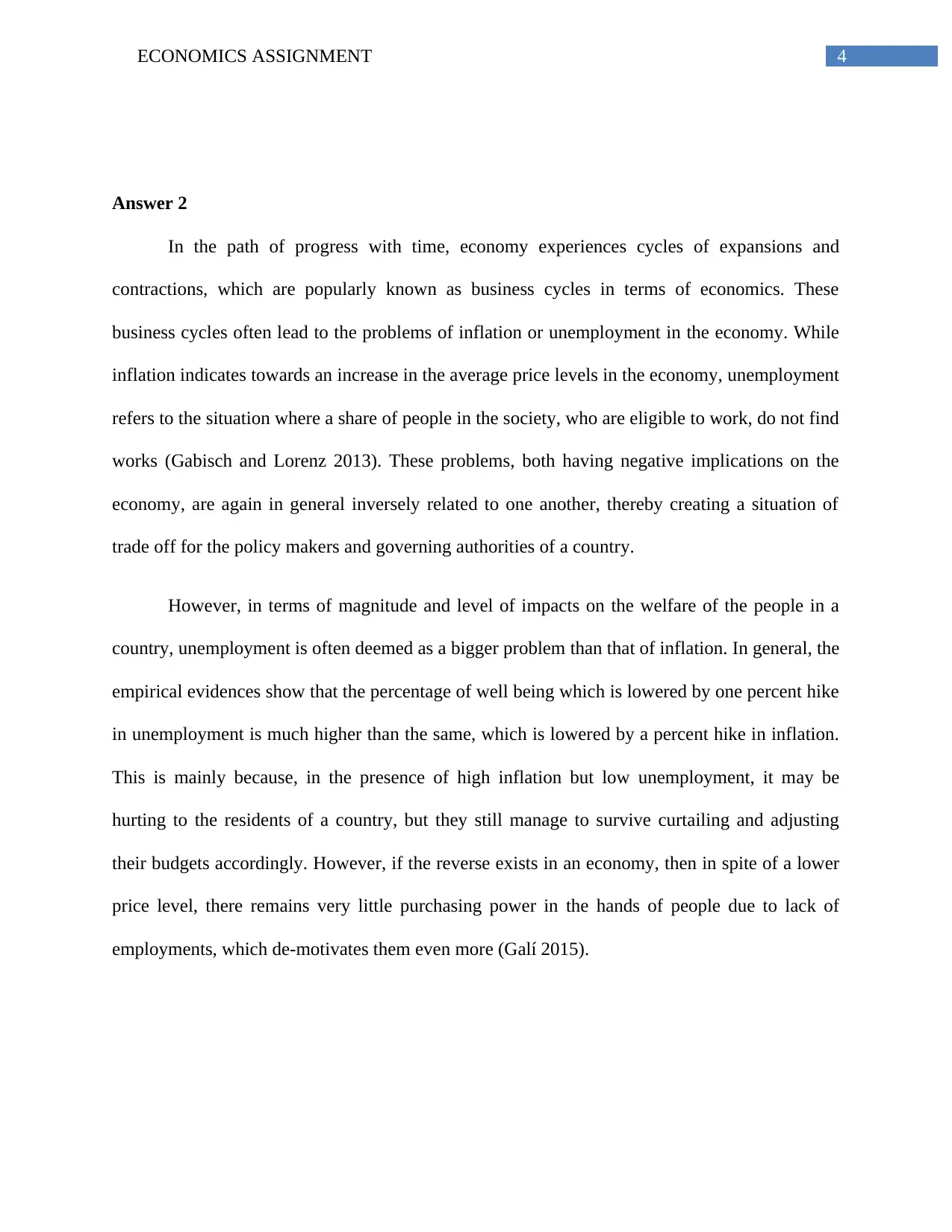
4ECONOMICS ASSIGNMENT
Answer 2
In the path of progress with time, economy experiences cycles of expansions and
contractions, which are popularly known as business cycles in terms of economics. These
business cycles often lead to the problems of inflation or unemployment in the economy. While
inflation indicates towards an increase in the average price levels in the economy, unemployment
refers to the situation where a share of people in the society, who are eligible to work, do not find
works (Gabisch and Lorenz 2013). These problems, both having negative implications on the
economy, are again in general inversely related to one another, thereby creating a situation of
trade off for the policy makers and governing authorities of a country.
However, in terms of magnitude and level of impacts on the welfare of the people in a
country, unemployment is often deemed as a bigger problem than that of inflation. In general, the
empirical evidences show that the percentage of well being which is lowered by one percent hike
in unemployment is much higher than the same, which is lowered by a percent hike in inflation.
This is mainly because, in the presence of high inflation but low unemployment, it may be
hurting to the residents of a country, but they still manage to survive curtailing and adjusting
their budgets accordingly. However, if the reverse exists in an economy, then in spite of a lower
price level, there remains very little purchasing power in the hands of people due to lack of
employments, which de-motivates them even more (Galí 2015).
Answer 2
In the path of progress with time, economy experiences cycles of expansions and
contractions, which are popularly known as business cycles in terms of economics. These
business cycles often lead to the problems of inflation or unemployment in the economy. While
inflation indicates towards an increase in the average price levels in the economy, unemployment
refers to the situation where a share of people in the society, who are eligible to work, do not find
works (Gabisch and Lorenz 2013). These problems, both having negative implications on the
economy, are again in general inversely related to one another, thereby creating a situation of
trade off for the policy makers and governing authorities of a country.
However, in terms of magnitude and level of impacts on the welfare of the people in a
country, unemployment is often deemed as a bigger problem than that of inflation. In general, the
empirical evidences show that the percentage of well being which is lowered by one percent hike
in unemployment is much higher than the same, which is lowered by a percent hike in inflation.
This is mainly because, in the presence of high inflation but low unemployment, it may be
hurting to the residents of a country, but they still manage to survive curtailing and adjusting
their budgets accordingly. However, if the reverse exists in an economy, then in spite of a lower
price level, there remains very little purchasing power in the hands of people due to lack of
employments, which de-motivates them even more (Galí 2015).

5ECONOMICS ASSIGNMENT
Answer 3
Trade agreements are instruments of facilitating trade and commercial activities between
different countries, with steps including alleviation of tariffs, quotas and those facilitating free
movement of resources as well as goods and services. According to the neo-liberal school of
thought, these trade agreements are viewed as instruments to facilitate growth in the developing
countries, by reducing poverty and inequality in the same. This is considerably true as with trade
agreements and a consequent flow of technologies and upsurge in the productive activities, these
nations embark on the path of increased economic growth. Trade agreements often facilitate
inflow of investments from developed nations to the developing ones, which facilitate industrial
growth, thereby having positive implications on the employment scenarios and the overall
standard of living in the country (Dür, Baccini and Elsig 2014).
However, there can be several negative implications of trade agreements, especially on
the developing economies. The first and foremost of these problems is that of brain drain and
theft of the intellectual properties, which happens very frequently in developing nations due to
the absence of strict and vigilant legal framework. These do not contribute positively in
improving the standard of living of the residents of the developing countries. Free trade
agreements often lead to inflow of cheaper foreign commodities in the markets of the developing
economies, which by capturing bigger market share, poses as credible threats to the development
of the domestic industries of these countries (Irwin 2015). This in turn, increases the burden of
poverty and inequality in the developing economies. Lack of environmental protections also
leads to improper and excessive improper utilization of natural resources, which thereby hampers
the environmental conditions of the developing countries.
Answer 3
Trade agreements are instruments of facilitating trade and commercial activities between
different countries, with steps including alleviation of tariffs, quotas and those facilitating free
movement of resources as well as goods and services. According to the neo-liberal school of
thought, these trade agreements are viewed as instruments to facilitate growth in the developing
countries, by reducing poverty and inequality in the same. This is considerably true as with trade
agreements and a consequent flow of technologies and upsurge in the productive activities, these
nations embark on the path of increased economic growth. Trade agreements often facilitate
inflow of investments from developed nations to the developing ones, which facilitate industrial
growth, thereby having positive implications on the employment scenarios and the overall
standard of living in the country (Dür, Baccini and Elsig 2014).
However, there can be several negative implications of trade agreements, especially on
the developing economies. The first and foremost of these problems is that of brain drain and
theft of the intellectual properties, which happens very frequently in developing nations due to
the absence of strict and vigilant legal framework. These do not contribute positively in
improving the standard of living of the residents of the developing countries. Free trade
agreements often lead to inflow of cheaper foreign commodities in the markets of the developing
economies, which by capturing bigger market share, poses as credible threats to the development
of the domestic industries of these countries (Irwin 2015). This in turn, increases the burden of
poverty and inequality in the developing economies. Lack of environmental protections also
leads to improper and excessive improper utilization of natural resources, which thereby hampers
the environmental conditions of the developing countries.
⊘ This is a preview!⊘
Do you want full access?
Subscribe today to unlock all pages.

Trusted by 1+ million students worldwide
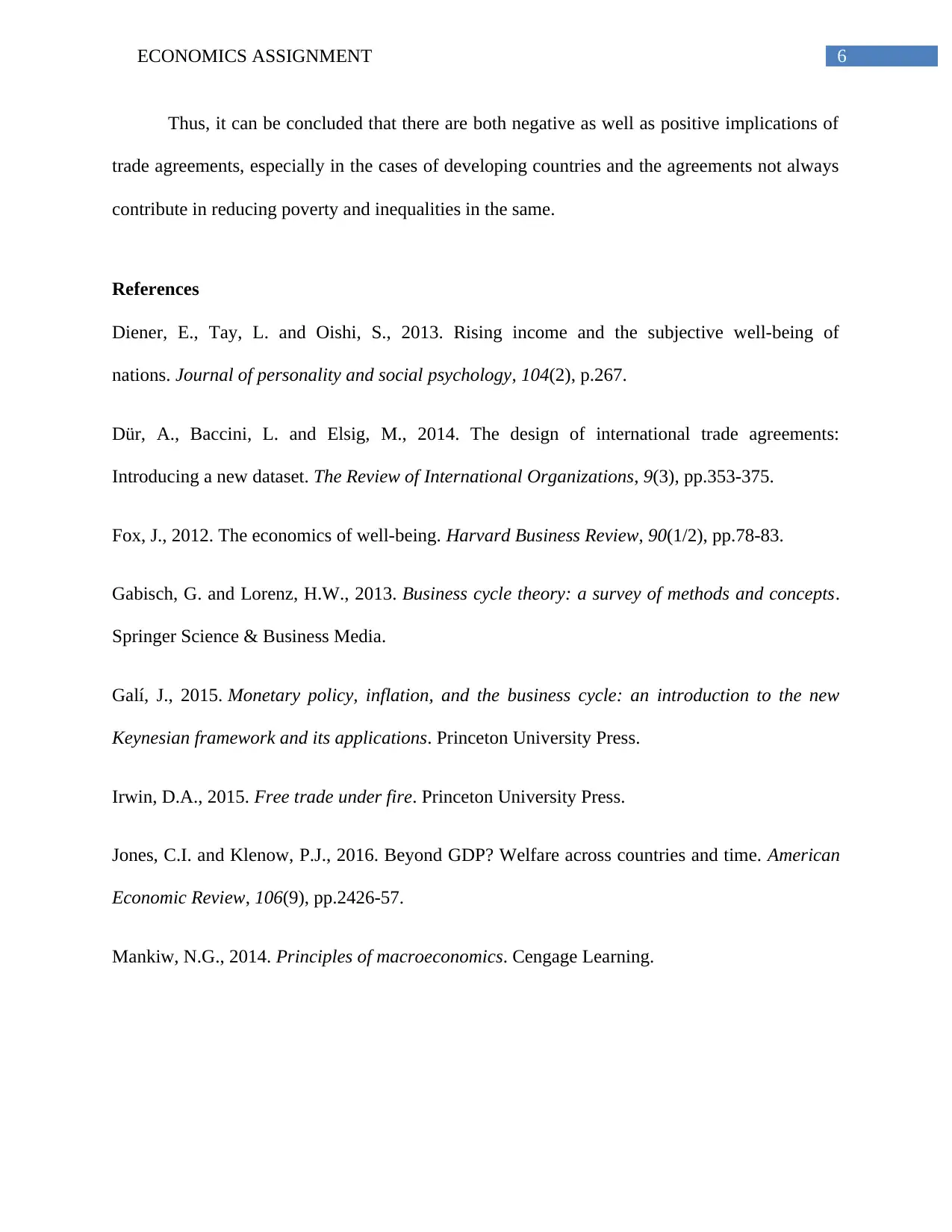
6ECONOMICS ASSIGNMENT
Thus, it can be concluded that there are both negative as well as positive implications of
trade agreements, especially in the cases of developing countries and the agreements not always
contribute in reducing poverty and inequalities in the same.
References
Diener, E., Tay, L. and Oishi, S., 2013. Rising income and the subjective well-being of
nations. Journal of personality and social psychology, 104(2), p.267.
Dür, A., Baccini, L. and Elsig, M., 2014. The design of international trade agreements:
Introducing a new dataset. The Review of International Organizations, 9(3), pp.353-375.
Fox, J., 2012. The economics of well-being. Harvard Business Review, 90(1/2), pp.78-83.
Gabisch, G. and Lorenz, H.W., 2013. Business cycle theory: a survey of methods and concepts.
Springer Science & Business Media.
Galí, J., 2015. Monetary policy, inflation, and the business cycle: an introduction to the new
Keynesian framework and its applications. Princeton University Press.
Irwin, D.A., 2015. Free trade under fire. Princeton University Press.
Jones, C.I. and Klenow, P.J., 2016. Beyond GDP? Welfare across countries and time. American
Economic Review, 106(9), pp.2426-57.
Mankiw, N.G., 2014. Principles of macroeconomics. Cengage Learning.
Thus, it can be concluded that there are both negative as well as positive implications of
trade agreements, especially in the cases of developing countries and the agreements not always
contribute in reducing poverty and inequalities in the same.
References
Diener, E., Tay, L. and Oishi, S., 2013. Rising income and the subjective well-being of
nations. Journal of personality and social psychology, 104(2), p.267.
Dür, A., Baccini, L. and Elsig, M., 2014. The design of international trade agreements:
Introducing a new dataset. The Review of International Organizations, 9(3), pp.353-375.
Fox, J., 2012. The economics of well-being. Harvard Business Review, 90(1/2), pp.78-83.
Gabisch, G. and Lorenz, H.W., 2013. Business cycle theory: a survey of methods and concepts.
Springer Science & Business Media.
Galí, J., 2015. Monetary policy, inflation, and the business cycle: an introduction to the new
Keynesian framework and its applications. Princeton University Press.
Irwin, D.A., 2015. Free trade under fire. Princeton University Press.
Jones, C.I. and Klenow, P.J., 2016. Beyond GDP? Welfare across countries and time. American
Economic Review, 106(9), pp.2426-57.
Mankiw, N.G., 2014. Principles of macroeconomics. Cengage Learning.
1 out of 7
Related Documents
Your All-in-One AI-Powered Toolkit for Academic Success.
+13062052269
info@desklib.com
Available 24*7 on WhatsApp / Email
![[object Object]](/_next/static/media/star-bottom.7253800d.svg)
Unlock your academic potential
Copyright © 2020–2026 A2Z Services. All Rights Reserved. Developed and managed by ZUCOL.





